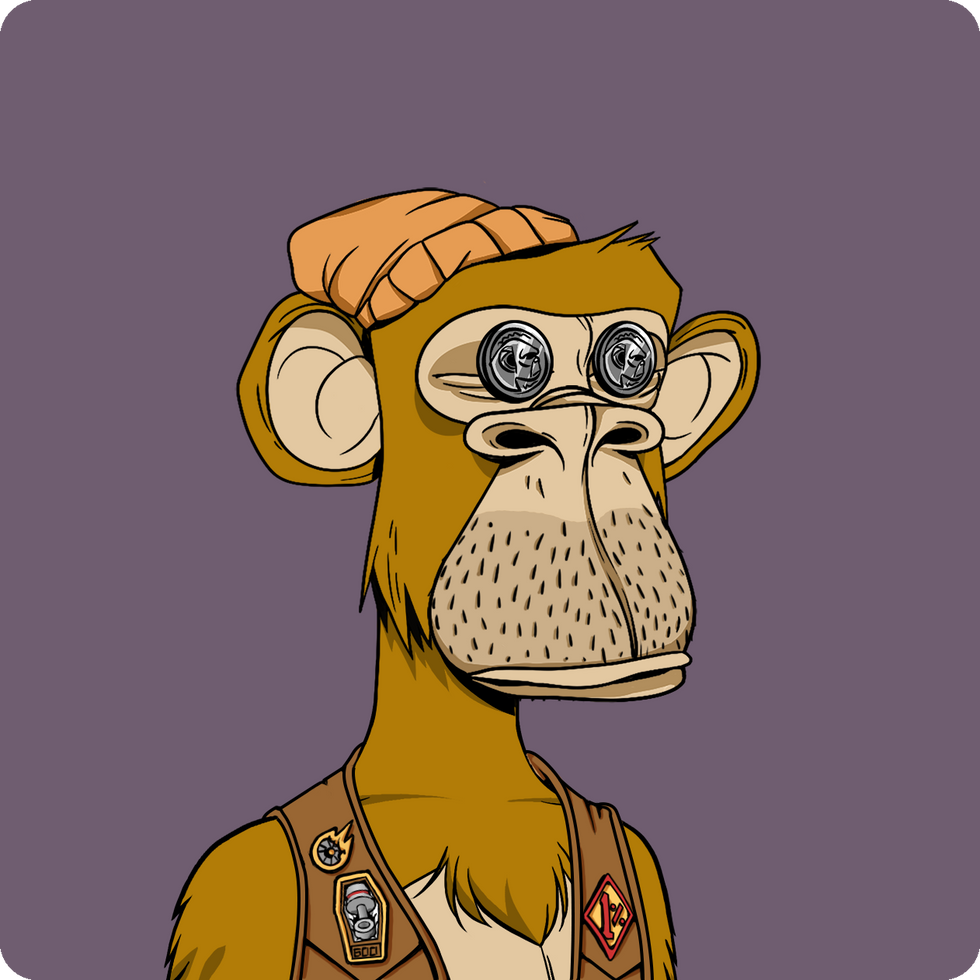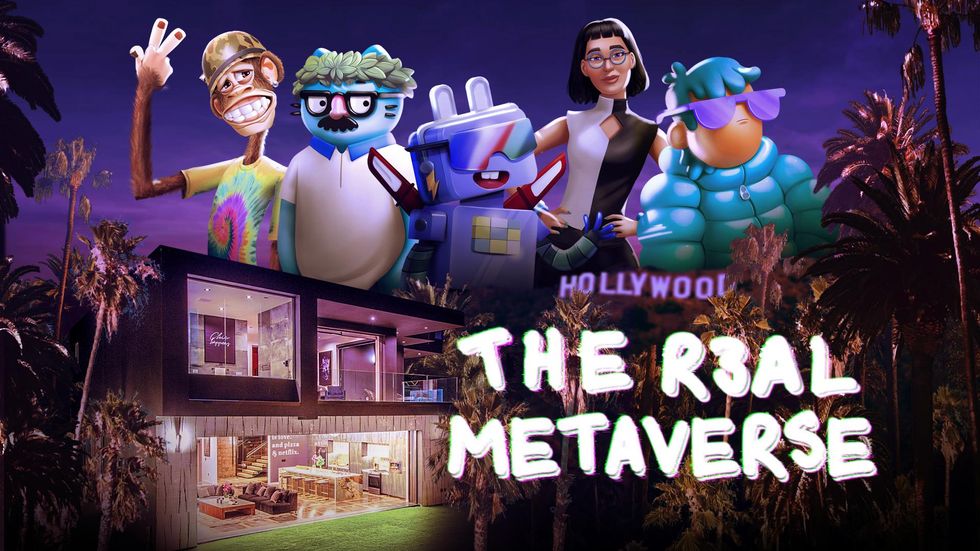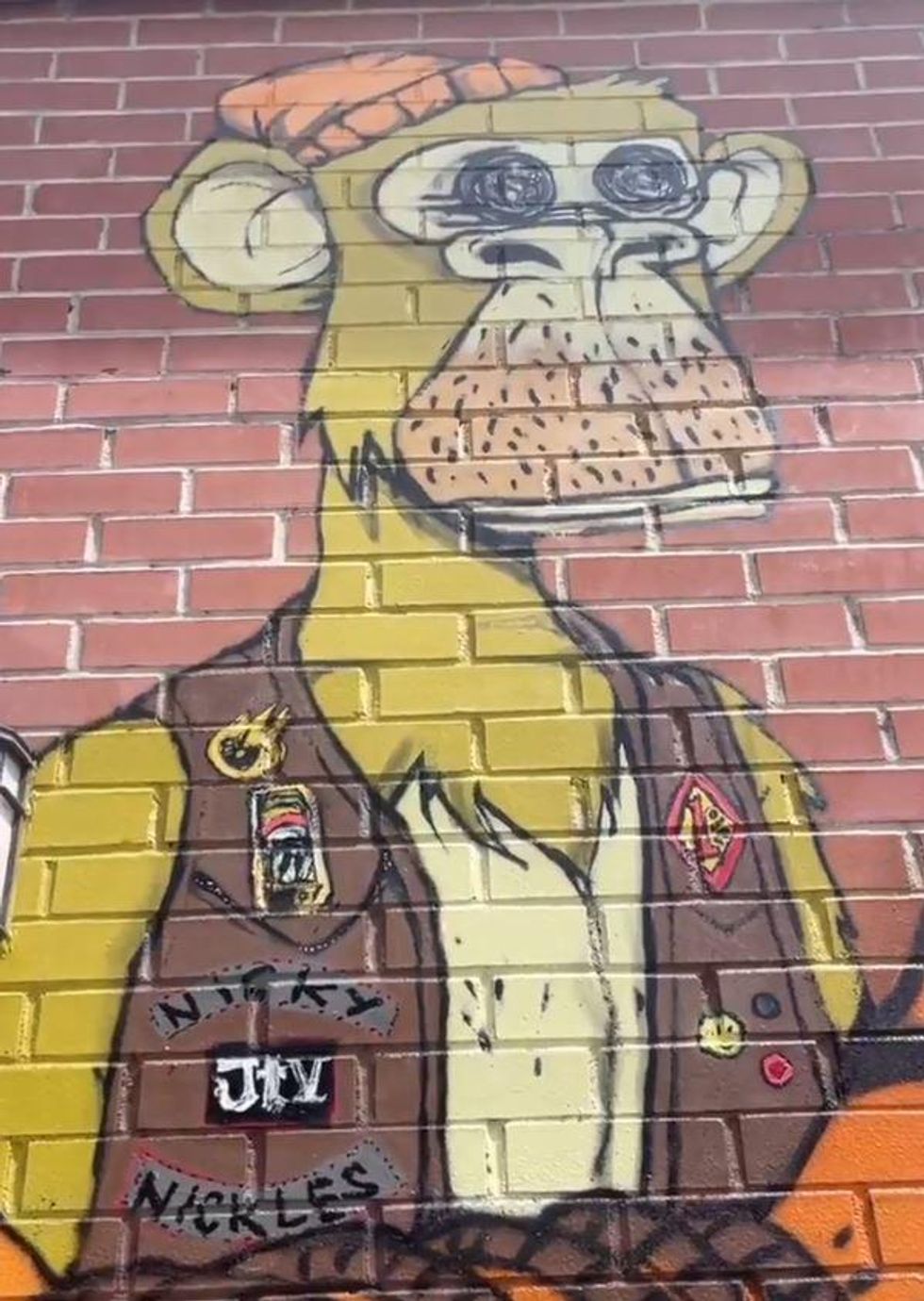Get in the KNOW
on LA Startups & Tech
Christian Hetrick is dot.LA's Entertainment Tech Reporter. He was formerly a business reporter for the Philadelphia Inquirer and reported on New Jersey politics for the Observer and the Press of Atlantic City.
On a Zoom call last week, Gene Nubla was explaining the name and origin story he gave “Nicky Nickels,” his Bored Ape NFT who will be a character in a forthcoming novel.
Nubla’s Bored Ape Yacht Club #6717 wears a leather vest and orange beanie hat, but the cartoon ape’s most distinctive feature is the silver coins covering his eyes. The 39-year-old Nubla, who works as associate vice president for a flower delivery service, imagined his Bored Ape as a member of a biker gang called the “Apes of Anarchy” who died during a botched cargo heist. Loved ones sometimes place silver dollars over the eyes of the dead during funerals, but Nicky’s family used plain old nickels, Nubla told dot.LA. That somehow barred the ape from properly entering the afterlife, rendering him undead.
It may not be the best ghost story to come out of Los Angeles, but Nicky will soon haunt the pages of a book written by bestselling author Neil Strauss, who has penned autobiographies for the likes of Marilyn Manson and Jenna Jameson. Nubla has licensed Nicky to an NFT storytelling project called Jenkins the Valet, which is backed by Creative Artists Agency and will see Strauss cobble together stories from various Bored Ape holders.

Nubla’s Bored Ape Yacht Club #6717, which he affectionately named "Nicky Nickels."
Photo courtesy of Gene Nubla
“This goes into the philosophy of Web3—like, I can participate as an owner now,” said Nubla. “I'm in the door now, versus on the outside looking in and just watching the movies [and] paying the ticket.”
These days, there are scores of artists, startups and entertainment companies—as well as ordinary NFT holders—who are parlaying non-fungible tokens into commercialized intellectual property. Santa Monica-based Universal Music Group, one of the world’s largest record labels, has created a “metaverse group” consisting of four Bored Apes who ostensibly make music, while crypto exchange Coinbase is using Bored Apes as characters for a film trilogy. Talent agencies like WME and United Talent Agency, meanwhile, have added Bored Apes and other NFT characters to their client rosters.
Nubla’s Bored Ape Yacht Club #6717, which he affectionately named "Nicky Nickels."
“This goes into the philosophy of Web3—like, I can participate as an owner now,” said Nubla. “I'm in the door now, versus on the outside looking in and just watching the movies [and] paying the ticket.”
These days, there are scores of artists, startups and entertainment companies—as well as ordinary NFT holders—who are parlaying non-fungible tokens into commercialized intellectual property. Santa Monica-based Universal Music Group, one of the world’s largest record labels, has created a “metaverse group” consisting of four Bored Apes who ostensibly make music, while crypto exchange Coinbase is using Bored Apes as characters for a film trilogy. Talent agencies like WME and United Talent Agency, meanwhile, have added Bored Apes and other NFT characters to their client rosters.
These creative works are possible because blockchain firms like Yuga Labs, the company behind Bored Ape Yacht Club, have attached broad commercialization rights to NFTs, which are unique digital assets verified using blockchain technology. Granting those rights could boost the value of NFT collections by making them more culturally relevant, according to experts, though it remains to be seen whether such projects can appeal to audiences beyond NFT adopters.
A lot of legal questions remain, too, as actor and producer Seth Green just learned the hard way. Green is developing a hybrid live-action/animated comedy called “White Horse Tavern,” in which the creator’s own Bored Ape—whom Green affectionately named “Fred”—comes to life as a friendly neighborhood bartender. The project was almost sabotaged last month when a scammer duped Green in an online phishing scheme—stealing four of his NFTs, including Fred. Since Bored Ape NFTs come with a license to commercialize the art, Green may have momentarily lost the rights to produce the show (Fred has since returned home safely). The drama turned Green into a poster child for how sketchy the world of NFTs can still be—the “Wild West” of digital assets, as some observers have put it.
Jeremy Goldman, a Los Angeles attorney who leads the blockchain group at law firm Frankfurt Kurnit Klein & Selz, credits companies like Yuga Labs for generating immense value for their NFT collections. The problem, as he sees it, are the collections’ relatively brief terms and conditions that don’t spell out what happens in certain situations, like when an NFT is stolen. That has the risk of killing projects and productions if investors or distributors are uncertain of the consequences.
“All of these NFT projects, including Bored Ape Yacht Club, are highly experimental and in some ways were never meant for primetime,” Goldman told dot.LA. “A lot of questions about the license are sort of unanswered.”
That hasn’t stopped some entertainment tech firms from sticking NFT avatars in their stories. L.A.-based Invisible Universe is developing an animated parody called “The R3al Metaverse,” which will include characters from five NFT collections. (Disclosure: dot.LA co-founder and executive chairman Spencer Rascoff is an investor in Invisible Universe). 
The startup bought three NFTs and secured licenses for two more that fit well with the story, CEO Tricia Biggio told dot.LA. Just to be sure, Invisible Universe approached the creators behind the NFT projects, as well. While those organizations had varying views on using the IP, they all saw the value of Invisible Universe’s project, she noted.
“It was funny—some of them would be like, ‘Well, you actually don't have to run it by us,’” Biggio said.
In “The R3al Metaverse,” NFTs who live in the digital world come over to the real one after they’re cast in a reality TV show and move in together. The parody pokes fun at the debate around the value of NFTs, as well: In one episode, the characters stare at a painting and are confused by its lack of “real-world application” besides being a wall decoration. (“Like zero utility,” one observes, according to a storyboard of the scene.) Invisible Universe will release around 40 episodes of the program on social media platforms starting in late July, with each episode running between 45 and 90 seconds.
Who will watch a show about NFTs—which, for all of their recent hype, are still owned by just a tiny fraction of the population? Biggio said that the audience for “The R3al Metaverse” will primarily be holders of its featured NFT communities: Bored Ape Yacht Club, Cool Cats, Doodles, World of Women and Robotos, which collectively have roughly 50,000 tokens in circulation. That said, Biggio believes the show can build an audience outside the not-yet-mainstream NFT market and, in turn, boost the value of those collections.
“Because we aren't gating the content, we have a unique opportunity to onroad people into the Web3 space who enjoy the content, fall in love with the characters and want to be a part of the collaborative storytelling experience,” Biggio said.
At their most basic level, NFTs—like artwork at large—generate much of their value from their scarcity and cultural relevance. Yet companies like Yuga Labs have popularized the idea of giving NFT holders commercial rights as well, allowing Bored Ape holders to put their ape’s face on a t-shirt or other merchandise and sell it. That not only makes the NFT itself more lucrative, but may well make the entire collection more valuable as Bored Apes are plastered on storefronts or featured in films.
“By giving broad IP rights—either making them public domain or granting commercial rights to holders—you're increasing the chances, potentially, that these items are going to get out there and go viral and become culturally relevant, and therefore sought after,” said Goldman, the attorney.
Bill Starkov, a real estate developer who lives near Calabasas, “right by the Kardashians,” in his words, is the founder of another primate-inspired NFT project, Apocalyptic Apes. (The collection’s zombified primates look like scarier versions of Bored Apes.) Starkov said his team gave NFT holders the right to do “whatever you want” with the artwork—so long as they don’t use the Apocalyptic Apes brand name. “We have to make sure they use it properly enough and it's used to promote our project and our brand in a good way,” he explained.
Apocalyptic Ape holders have placed their simians on hot sauce bottles, exercise equipment and sunglasses, he noted, while on the entertainment side, a car-racing game, comic books and movies depicting the apes are all in the works, too. Starkov, who goes by Fity.Eth online, has also partnered with Nicky Diamonds, the owner of clothing company Diamond Supply, on licensing deals with Ape holders to create merchandise. Those deals are generating tens of thousands of dollars for ape holders who collaborated with Diamond, he said.
“One thing that people are sleeping on is the understanding of IP rights,” Starkov said of some people in the NFT community. “They think it's a quick flip, but it's not. It's something long-term. It's something that's here to stay. It's a unique opportunity to create wealth.”
Nubla is among the NFT holders who have taken advantage of those IP rights. Speaking through an augmented reality filter on his computer that made him look like Nicky Nickels, Nubla said he’s earned some cash by allowing artists to make works based on his Bored Ape, including one artist who sells lapel pins bearing NFT art. A street painting of Nicky also adorns the side of a brick building in Brooklyn—part of a mural by the graffiti artist Masnah, who was paid for his work by NFT holders.
When the Florida-based startup Tally Labs launched the Jenkins the Valet project last June, Nubla was one of the 69 lucky people to randomly mint a rare “Yacht” NFT. That allowed him to license his Bored Ape as a character in Strauss’ novel and receive a share of the book’s royalties. Nubla debated selling the Yacht NFT as its value reached six figures, but ultimately decided to keep it and build out Nicky’s IP “just to see where it goes.”
Nubla does see some risk in NFT collections decentralizing their IP; he noted that there isn’t much stopping another Bored Ape holder from using their NFT to promote ideas or views that others may disagree with or find offensive. But like a lot of people involved in the space, he’s enamored with the idea of Web3—a decentralized vision for the internet that runs on blockchain-powered applications.
“It'd be nice to be able to benefit off the royalties of anything that comes off this,” Nubla said of the Strauss novel, which is coming out this summer. “But I'm doing it mainly just for the vibes.”
Christian Hetrick is dot.LA's Entertainment Tech Reporter. He was formerly a business reporter for the Philadelphia Inquirer and reported on New Jersey politics for the Observer and the Press of Atlantic City.
On this episode of the LA Venture podcast, JLL Spark’s Laurent Grill talks about the world of proptech, COVID’s impact on the office and lowering buildings’ emissions.
Grill joined JLL Spark, the investment arm of global commercial real estate company JLL, over a year ago. The firm focuses on Series A and B investments of between $2 million and $10 million in a wide range of areas in real estate technology, including smart buildings, construction tech and tenant experience platforms — all of which have become more relevant in a post-pandemic world.
As employees filter back into offices, Grill said the purpose and experiences of those spaces will likely change for a world in which more companies adopt a hybrid or remote work model. The challenge, he thinks, will be in creating an environment that doesn’t promote employees’ isolation.
“I don't necessarily believe that the future of the office looks like a bunch of cubicles,” said Grill. “There's definitely going to be a need to create an environment where people can come back together, where we're giving them the tools to do it in a way that is exciting so that people want to be back.”
Office space is one issue, there’s also the problem of building emissions. For example, Grill said 70% of New York City’s carbon emissions come from steel and concrete. That will need to change as cities become more serious about cutting their impact on the environment.
“One of the largest emitters is steal and concrete. If we can remove that from the supply chain and build, there's a lot of ways that we can actually lower emissions. And we just saw there was a skyscraper that was built purely on mass timber, which is really, really cool,” said Grill.
Grill added that we’re likely to see a flurry of mandates in the coming years aimed at reducing emissions from properties.
“These mandates will inspire companies to experiment with tons of new technologies,” he said. “And so as compliance deadlines draw closer, we're likely to see a wave of adoption [of] we'll call it ‘smart’ buildings, which really encompasses a variety of things.”
They include rental, data and internet-of-things infrastructure technologies that can track how buildings are being used, and squeeze new efficiencies out of them.
Grill sees proptech evolving much as fintech did five years ago.
“You're gonna have tons of innovation,” he said. “And you're gonna have tons of adoption across previously antiquated industries that will allow for some really, really big players.”
Keerthi Vedantam is a bioscience reporter at dot.LA. She cut her teeth covering everything from cloud computing to 5G in San Francisco and Seattle. Before she covered tech, Keerthi reported on tribal lands and congressional policy in Washington, D.C. Connect with her on Twitter, Clubhouse (@keerthivedantam) or Signal at 408-470-0776.
In Alex Israel’s utopia, you may never have to take out your credit card again.
Israel is the co-founder and CEO of Metropolis Technologies, a Los Angeles-based fintech and “mobility commerce” platform that has just raised $167 million in Series B funding, it announced on Wednesday. The round was co-led by L.A.-based growth equity firm 3L Capital and mobility-focused Assembly Ventures, with participation from Dragoneer Investment Group, Eldridge Industries, Silver Lake Waterman and UP Partners.
Metropolis, which has now raised $226 million in total funding, aims to take the grab-and-go model of Amazon’s physical retail locations and apply it to every parking garage, gas station, car wash and highway toll booth possible. Instead of paying for parking spaces at kiosks or having to deal with parking validation, the startup uses computer vision technology that connects users’ license plate numbers to their credit cards and automatically charges them.
“When you or I make a transaction on the phone or we buy something online, it's a modern experience—it's something we're very used to,” Israel told dot.LA. “When you get into the built environment, it gets convoluted and complex. We're simplifying and bringing all that seamless experience you expect in an online environment into real life.”
Though it was founded at the tail-end of 2017, Metropolis really began to take off during the pandemic as business owners embraced contactless payments. The startup says it has grown its user base 28 times over, to 1.8 million users, since February 2021 and now operates in more than 600 parking lots in over 60 cities across the U.S.
Israel noted that partnerships with real estate landlords have helped fuel that growth. Metropolis has also teamed with ride-sharing giant Uber on a new venture called Uber Park, which provides users with a checkout-free parking experience at specific garages via their Uber app. The company charges a monthly software-as-a-service fee to asset owners who deploy its technology, as well as a service fee to customers who sign up.
Israel added that the data Metropolis collects on parking activity can be leveraged to help users find parking spaces faster—a potentially valuable service in a car-centric city like L.A., where the amount of real estate dedicated to parking is larger than Manhattan. The rest of the U.S., where there are four parking spaces for every car on the road, is no exception, and Metropolis plans to use its new funding to scale up in markets like Seattle, Dallas-Fort Worth and New York.
“We're creating a single sign-on for the built environment,” Israel said.
Keerthi Vedantam is a bioscience reporter at dot.LA. She cut her teeth covering everything from cloud computing to 5G in San Francisco and Seattle. Before she covered tech, Keerthi reported on tribal lands and congressional policy in Washington, D.C. Connect with her on Twitter, Clubhouse (@keerthivedantam) or Signal at 408-470-0776.
Samson Amore is a reporter for dot.LA. He previously covered technology and entertainment for TheWrap and reported on the SoCal startup scene for the Los Angeles Business Journal. Send tips or pitches to samsonamore@dot.la and find him on Twitter at @Samsonamore. Pronouns: he/him
Santa Ana-based aircraft startup Overair has raised $145 million to develop and fly its flagship vehicle, a prototype electric airplane called Butterfly, by the second half of next year.
The investment was led by South Korean conglomerate Hanwha Group, which holds a 30% stake in Overair and has now poured a total of $170 million into the startup, according to TechCrunch. The funds specifically came from two of the conglomerate’s divisions, Hanwha Aerospace and Hanwha Systems, Overair said in a press release Tuesday.
Butterfly is part of a class of electric aircraft, known as eVTOL, that are capable of vertically taking off and landing and do not require a runway. Such aircraft require less space to operate and produce fewer or no carbon emissions, and have increasingly been floated for potential use as air taxis and for regional flights.
With the help of electric motors and battery packs provided by Hanwha, Overair said the six-seater Butterfly prototype should be ready to take flight by the second half of 2023. The startup was spun off in 2020 from Lake Forest-based, military-focused aerospace manufacturer Karem Aircraft.
“Our technology was meant to drop Navy SEALs into hot zones, and we’re going to use it for urban air mobility (UAM) so that you and I can go to a Rams game from Orange County,” Overair head of business development Josh Aronoff told TechCrunch.
Samson Amore is a reporter for dot.LA. He previously covered technology and entertainment for TheWrap and reported on the SoCal startup scene for the Los Angeles Business Journal. Send tips or pitches to samsonamore@dot.la and find him on Twitter at @Samsonamore. Pronouns: he/him
© dot.LA All rights reserved


